Canoe Adventure in Kushiro Marshland!
Get Up Close with Stunning Nature and Wildlife!
Get Up Close with Stunning Nature and Wildlife!
Publication Date:2024.11.01
Last Updated:2025.04.20
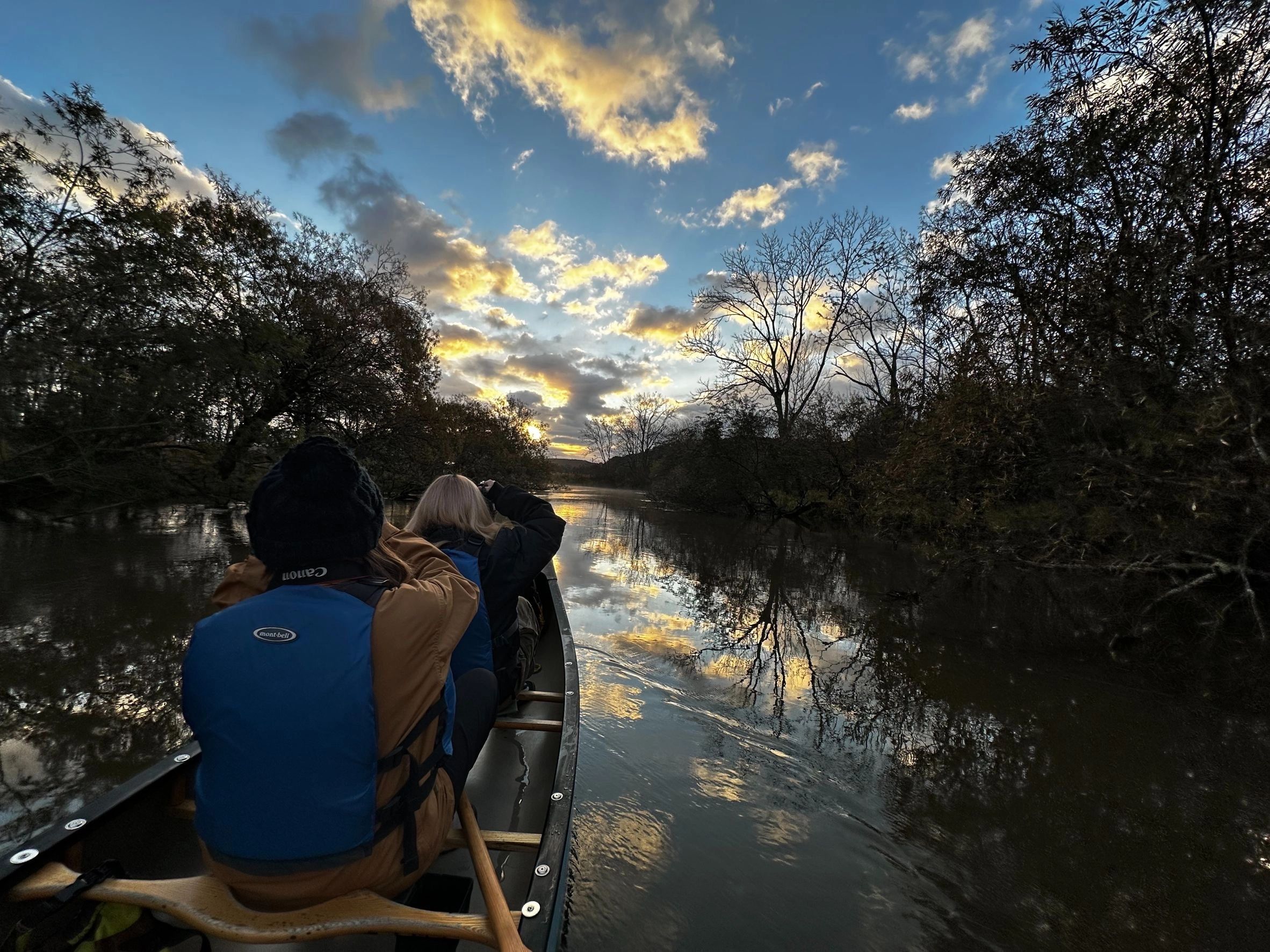
Contents
01
Basic Information about Kushiro Shitsugen Wetland
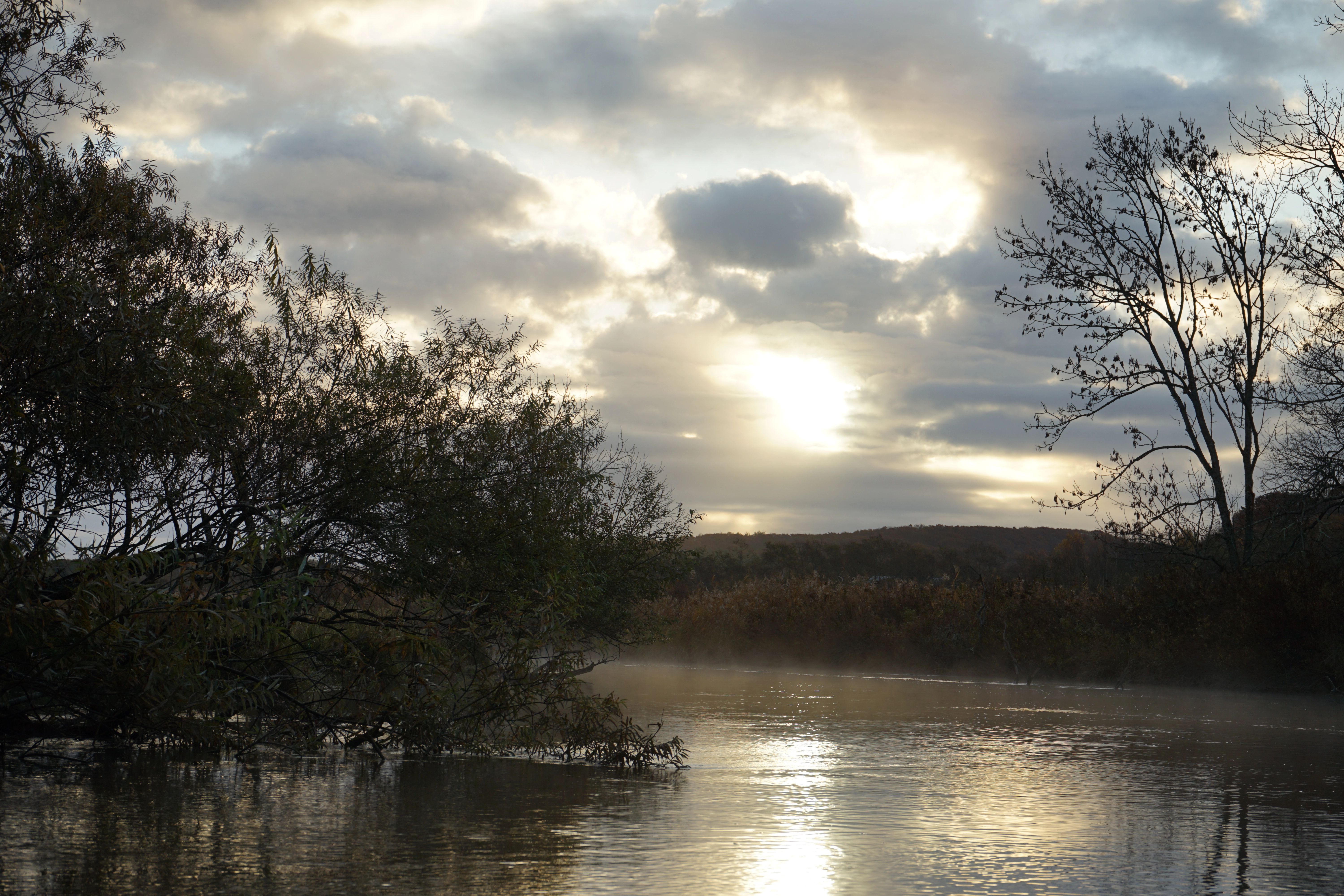
Eastern Hokkaido (Doto) is a vast area where untouched nature
thrives. Just about a 20-minute drive from the urban area of
Kushiro, a port town representing Eastern Hokkaido, lies Kushiro
Shitsugen National Park, Japan's largest expansive wetland. It
serves as a habitat for rare flora and fauna, and due to its
uniqueness, part of it is registered under the Ramsar Convention.
Within this magnificent nature flows the Kushiro River, where
various canoe tours are available. In fact, there are only a few
places in Japan where you can canoe in a national park, and
Kushiro Shitsugen is one of them. Here, you can closely observe
wildlife such as red-crowned cranes, Steller's sea eagles, and Ezo
deer. Kushiro Shitsugen offers year-round canoe tours, allowing
you to enjoy the great outdoors safely while listening to the
guide's explanations. This time, we will introduce actual
experiences with the guide Matsuzawa from "East Power," focusing
on canoe touring and nature experiences centered around Kushiro
Shitsugen. The content is packed with recommendations for those
considering a canoeing experience!
02
Canoe Experience
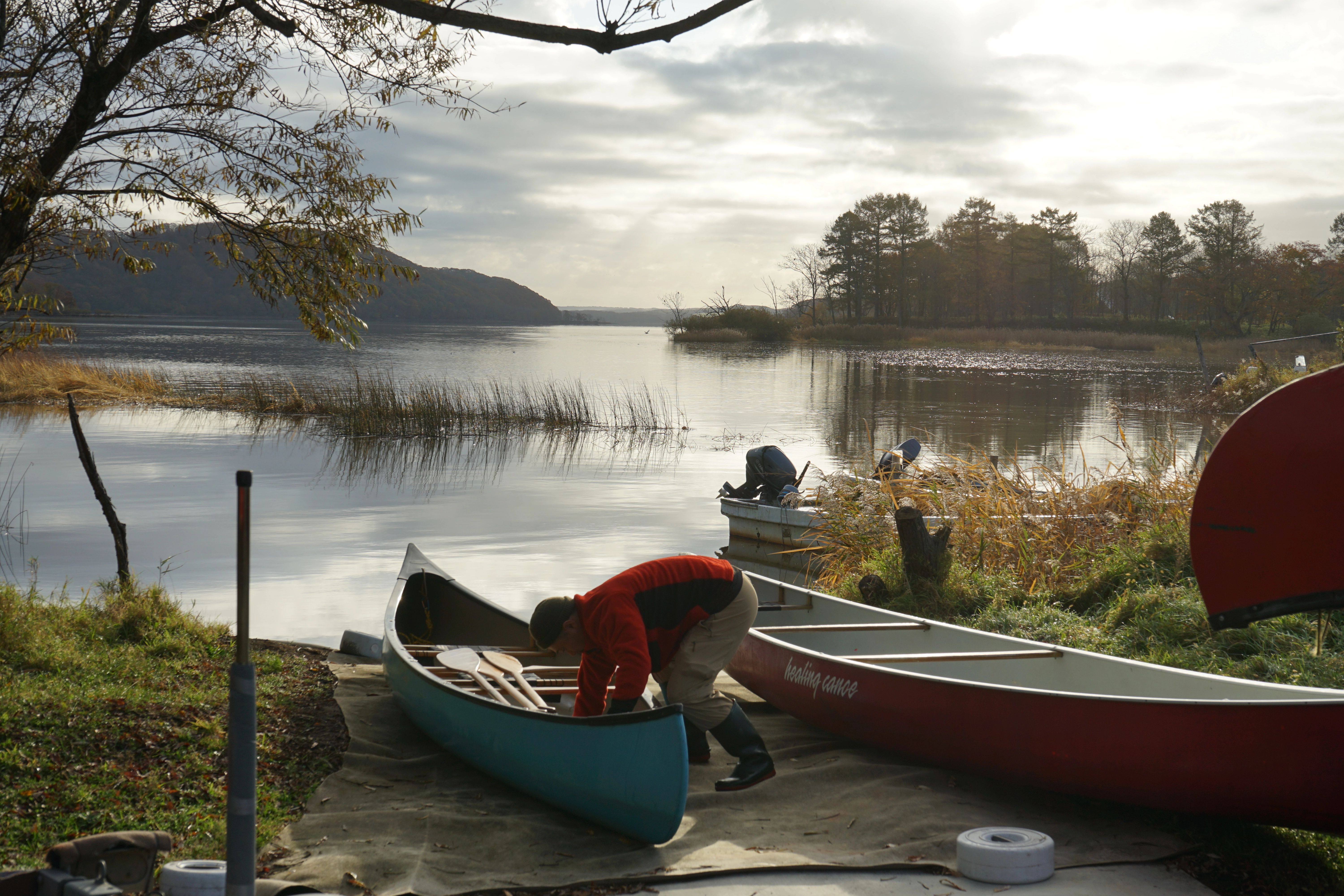
1.Gathering & Departure
East Power offers a variety of canoe experiences, ranging from a
light plan that allows you to enjoy a one-hour river descent to
a five-hour plan to thoroughly explore the Kushiro Shitsugen.
This time, we opted for a course where you can experience the
lower reaches of the Kushiro River flowing on the east side of
the Kushiro Shitsugen, specifically a round trip on the Arekinai
River early in the morning. The Arekinai River is a short 2 km
river that extends from Tōro Lake, a former sea lake within
Kushiro Shitsugen National Park, to the main stream of the
Kushiro River. The gentle flow of water allows you to leisurely
take in the scenery of the great outdoors and feel the presence
of birds and wildlife.
The meeting point is JR Tōro Station. It takes about 40 minutes to arrive from downtown Kushiro. Upon arrival, Matsuzawa warmly greets you with a car and it's a quick 2-minute drive to the starting point, Tōro Lake.
Once there, you sign the necessary documents and complete the payment, then promptly begin the experience. First, you put on the life jacket that has been prepared according to the height and weight you provided in advance. After placing your valuables in a waterproof bag, you listen to the safety instructions. The most important thing to be cautious about is capsizing. Across all operators, an average of 1.2 capsizing accidents occur yearly, so it’s crucial to listen carefully to the guide's instructions for safety. By the way, East Power has never experienced capsizing, which was reassuring even to this writer who is not fond of outdoor activities.
Once ready, you promptly get into the canoe and set off! The canoe seats three, and with guide Matsuzawa joining, beginners can feel at ease.
The meeting point is JR Tōro Station. It takes about 40 minutes to arrive from downtown Kushiro. Upon arrival, Matsuzawa warmly greets you with a car and it's a quick 2-minute drive to the starting point, Tōro Lake.
Once there, you sign the necessary documents and complete the payment, then promptly begin the experience. First, you put on the life jacket that has been prepared according to the height and weight you provided in advance. After placing your valuables in a waterproof bag, you listen to the safety instructions. The most important thing to be cautious about is capsizing. Across all operators, an average of 1.2 capsizing accidents occur yearly, so it’s crucial to listen carefully to the guide's instructions for safety. By the way, East Power has never experienced capsizing, which was reassuring even to this writer who is not fond of outdoor activities.
Once ready, you promptly get into the canoe and set off! The canoe seats three, and with guide Matsuzawa joining, beginners can feel at ease.
2.From Tōro Lake to the Arekinai River
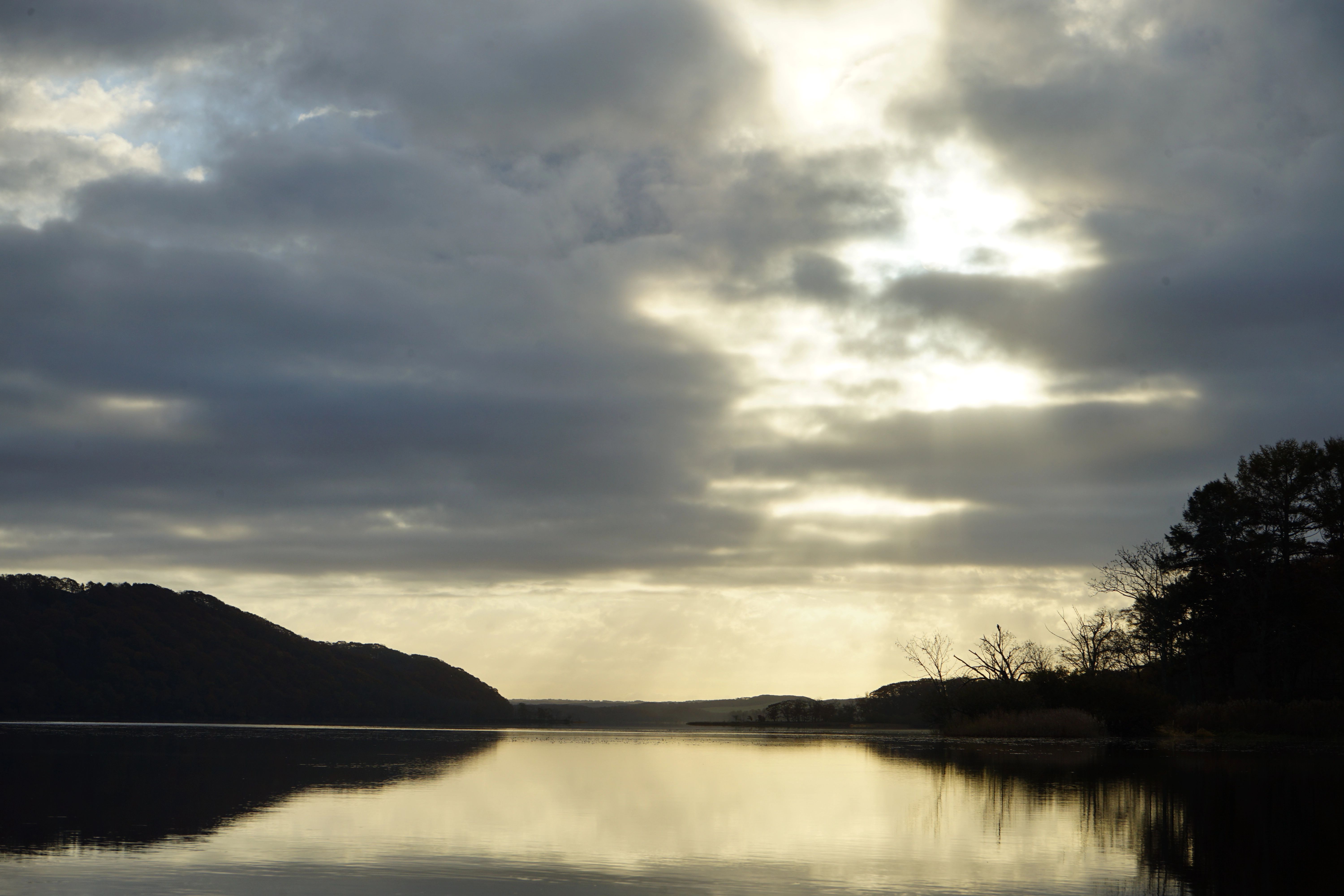
Since this experience took place early in the morning, we were
able to enjoy the mystical atmosphere of Tōro Lake enveloped in
mist rising from the water surface, contrasted beautifully by
the sunrise over the vast nature. After thoroughly enjoying the
scenery, we proceeded from Tōro Lake to the Arekinai River. The
Arekinai River is narrow, with trees growing densely right next
to it, providing an experience akin to traveling through a
forest. "Starting with this river, the Kushiro River remains in
its natural state, untouched by riverbank construction. The
opportunity to canoe in such an environment is quite rare
nationwide. Because the nature is untouched, you can feel the
presence of wildlife very closely. From autumn to winter, as the
leaves fall, it’s an excellent time to spot animals easily,"
Matsuzawa says.
Paddling the canoe under the overpass of the JR Senmō Main Line, a grand panorama of Kushiro Shitsugen Wetland unfolds. We encountered pairs of migratory birds, such as ducks gracefully swimming alongside the canoe, Ezo deer quietly watching us from the shadows, and black kites poised on tree branches scouting for prey.
Paddling the canoe under the overpass of the JR Senmō Main Line, a grand panorama of Kushiro Shitsugen Wetland unfolds. We encountered pairs of migratory birds, such as ducks gracefully swimming alongside the canoe, Ezo deer quietly watching us from the shadows, and black kites poised on tree branches scouting for prey.
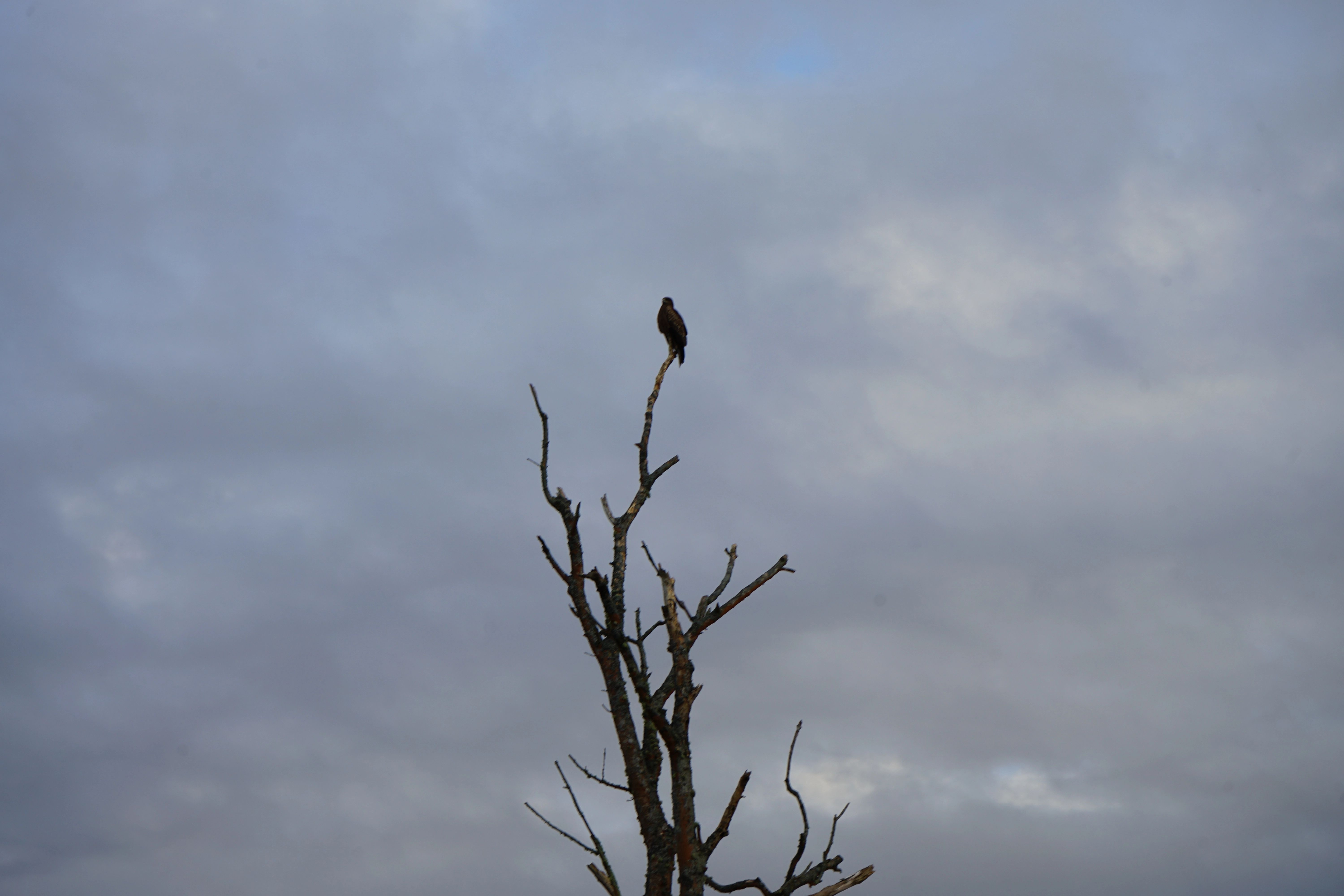
3.Turning Back at the Main Stream of the Kushiro River
As we descended the Arekinai River and reached the main stream
of the Kushiro River, we arrived at the turning point. Across
the river runs the track of the JR Senmō Main Line. It was still
early morning, so we didn't see any trains, but instead, we were
greeted by a fluffy Ezo red fox running along the tracks.
Depending on the timing, you might catch a glimpse of the "SL
Winter Wetlands" train, which operates exclusively in winter,
from the Kushiro River. "The Kushiro River has a fast current
and a long course, offering a more active canoeing experience.
On the other hand, the Arekinai River is calm with almost no
current, making it ideal for beginners or those who want a
lighter canoeing experience," Matsuzawa says. Due to rain from
the previous day, the river was flowing backward, a rare
occurrence attributed to the minimal height difference in the
Arekinai River.
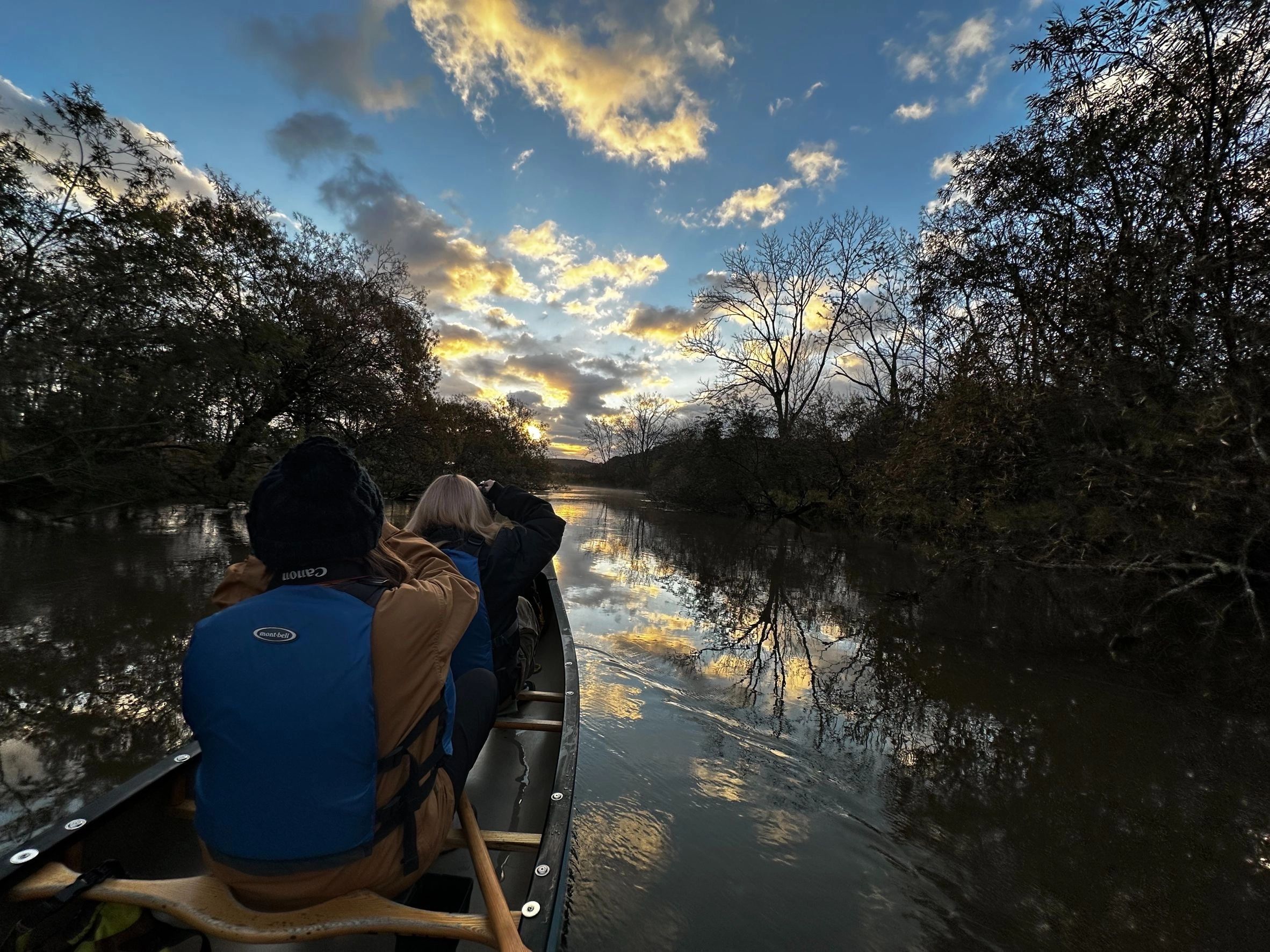
During the return trip to the lake, we barely needed to paddle
as we drifted along with the current. Additionally, the high
water levels allowed for a rare opportunity to explore waterways
that would normally have been dried up. "Because it's a natural
river, the situation changes daily. The shape of the river and
the scenery you can see are different every day, which is why
it's enjoyable to come back repeatedly. The views are entirely
different between early morning and evening, and across the four
seasons. Some repeat visitors come to experience these changes
multiple times," Matsuzawa says.
4.Heading Back to Tōro Lake via the Arekinai River
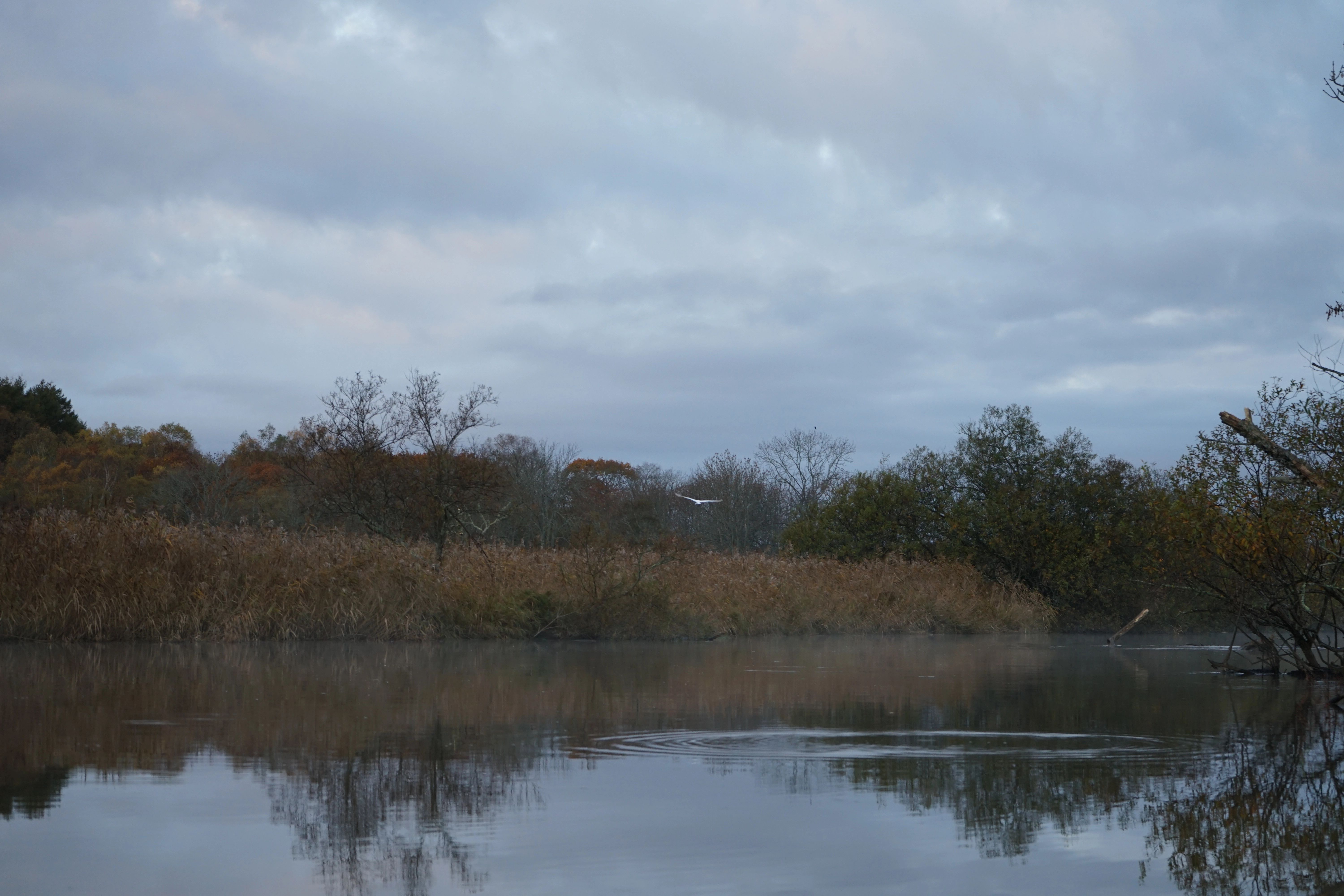
Returning by making a U-turn along the same river we came, I was
surprised by the scenery unfolding before us. Despite traveling
the same path, it felt like navigating through a completely
different river on the return journey. This is due to changes in
the play of light on the trees as the angle of the sun shifts
over time, as well as experiencing the natural environment and
presence of wildlife from different perspectives not seen on the
way out. Moreover, the return journey’s altered water flow
affects the canoe's speed, creating a distinct difference. As we
proceeded under the sunlight, a large shadow suddenly crossed
overhead. It was a red-crowned crane, registered as a Special
Natural Monument. This majestic bird, with a wingspan exceeding
2 meters, is one of Japan's largest birds and is a rare species
that thrives in the Kushiro Shitsugen. "There are about 1,900
red-crowned cranes in Japan, and it's lucky to see two of them!
During the canoe experience, you might see them roughly one in
five times," says Matsuzawa. Although it was a fleeting moment
that couldn't be captured on camera, the sight was spectacular.
While still exhilarated, we noticed a male Ezo deer intensely
watching us from the base of a tree at an exceptionally close
distance. "Autumn is when male Ezo deer become quite sensitive,
and you can hear their intense calls. Their antlers are also at
their most beautiful this time of year. You can generally tell
their age by the size of their antlers," Matsuzawa says.
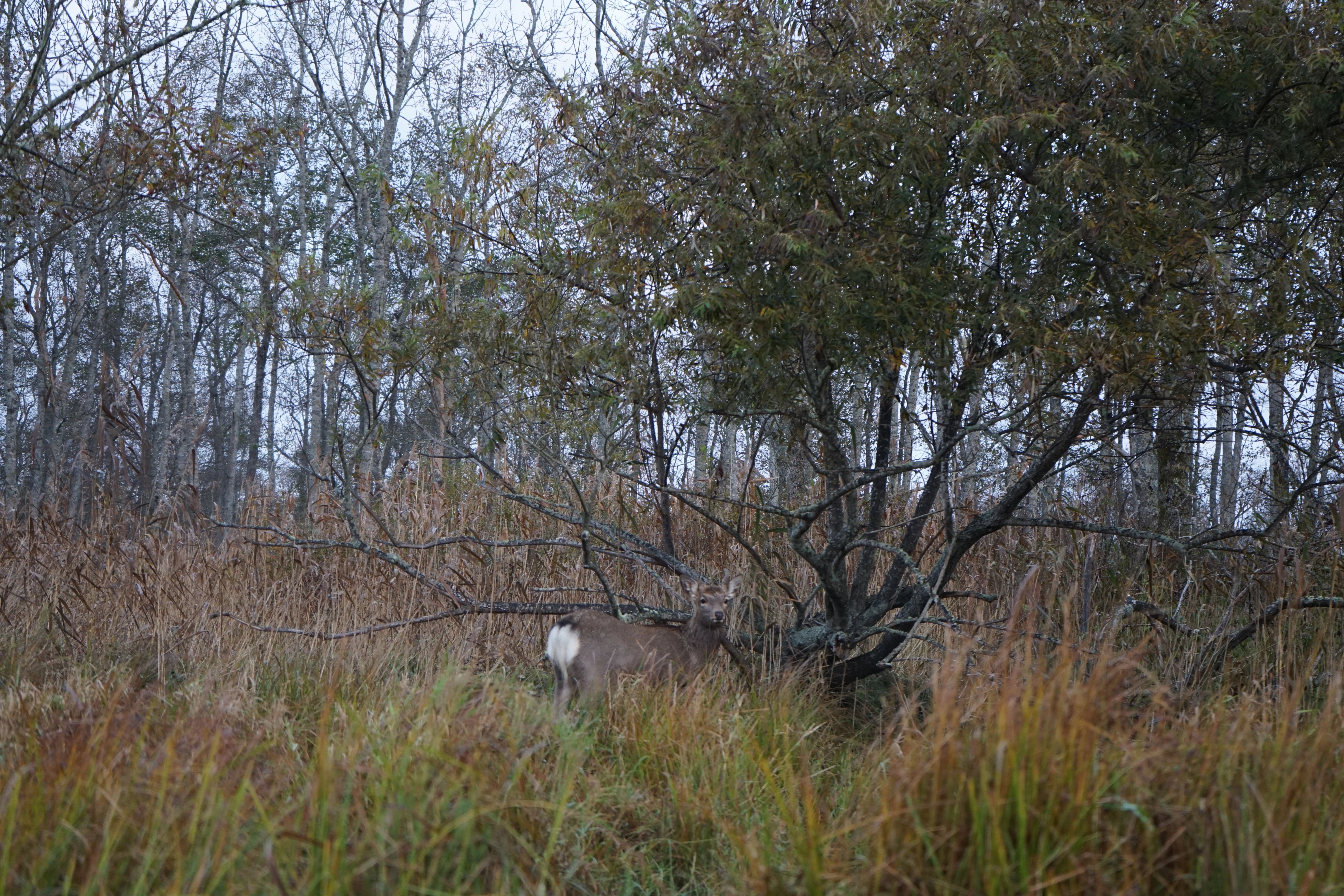
5.Returning to Tōro Lake and Concluding the Experience
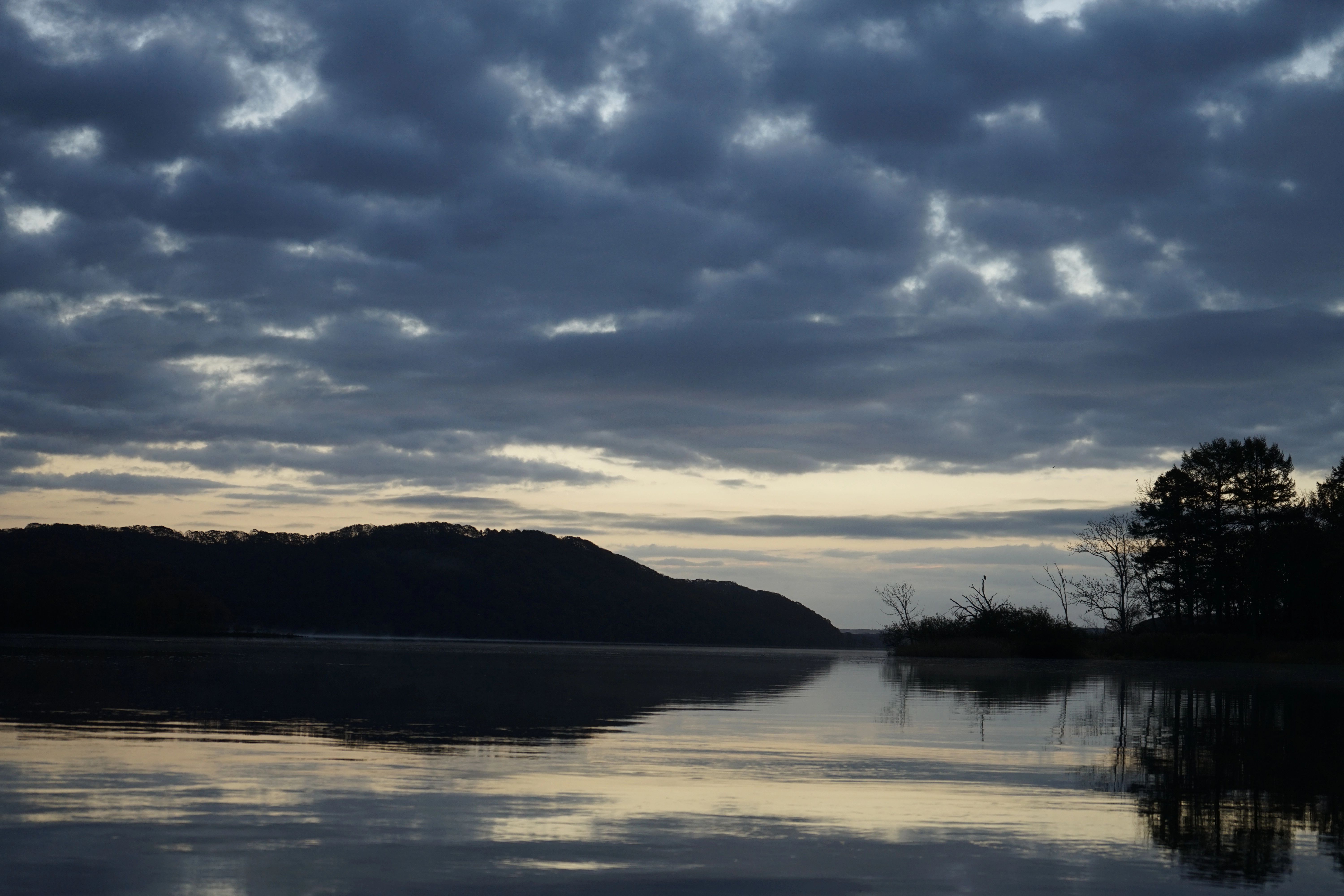
Upon exiting the Arekinai River and returning to Tōro Lake, the
sun had risen high, and the lake's surface sparkled brilliantly
under its light. Matsuzawa's words about how the scenery can
look completely different depending on the time and place were
truly felt. "I often hear from participants that it feels like
they aren't in Japan. The nature viewable at Kushiro Shitsugen
is that grand and exceptional. That's why I'm thinking of
offering experiences that can be enjoyed by a wider range of
guests. Currently, I'm operating as a one-man team, so I only
accept reservations for 1-2 people. However, in the future, I'd
like to provide experiences that families could enjoy. Of
course, the exclusivity of having a private tour will remain, so
you can have the vast nature of Kushiro Shitsugen all to
yourself," says Matsuzawa. The one-hour tour felt so short, yet
it allowed us to enjoy the magnificent nature and wildlife
safely while listening to Matsuzawa's guidance, even as
first-time canoeists. The view of Kushiro Shitsugen from the
canoe, inaccessible from observation towers, offers a truly
"extraordinary" experience. It’s a highly recommended activity
to try when you visit.
Tips and Recommended Clothing
Because it's a canoe experience through the great outdoors,
safety precautions are essential. Actions like "suddenly turning
around" or "making unauthorized movements" on the canoe are
prohibited as they might lead to capsizing accidents. Remember
to use restroom facilities before the tour since there are no
opportunities during it. If you are prone to motion sickness, it
might be wise to take medication beforehand. Also, pay attention
to your clothing. In summer, insects are present, so wearing
long sleeves is advisable. From autumn to winter, it's important
to wear insulating outerwear like down jackets, gloves, hats,
and scarves to block the cold air. Even if it was warm in the
morning, sitting still in a canoe with wind can chill your core
over time. It’s particularly essential to make thorough
preparations for early morning or evening tours.
To book the canoeing experience introduced here, click below!
[All Season Canoe: Arekinai River – Spring, Summer, Autumn,
Winter]
Introducing East Power
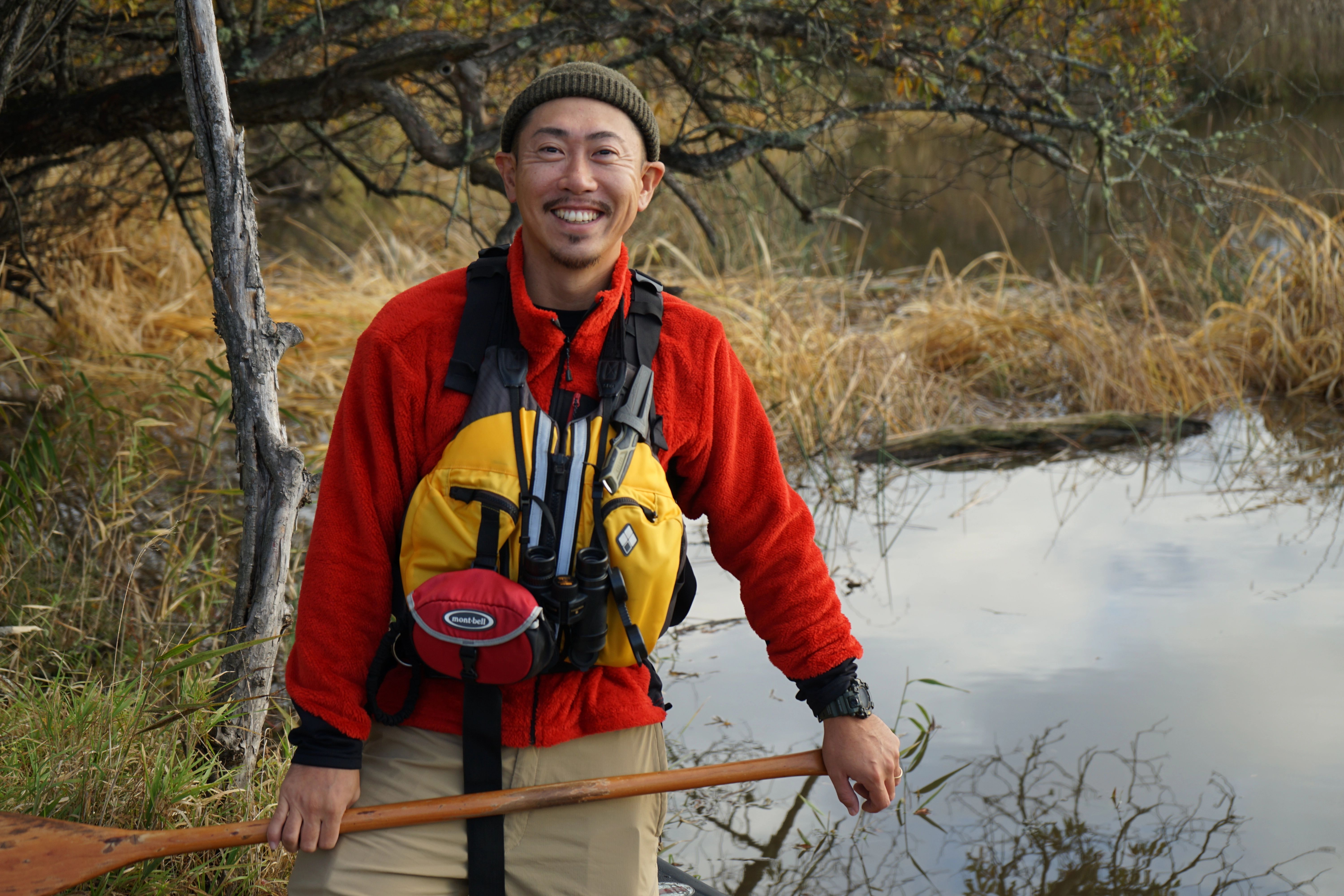
East Power offers year-round canoe and nature tours in the
Kushiro Shitsugen. It's very popular due to the opportunity to
enjoy the vast nature of the wetlands that changes with the
seasons, and in winter, you can explore the snowfields wearing
snowshoes. Matsuzawa, the guide and representative, is from
Kushiro City. Although he left his hometown to work in the
apparel industry, he decided to return to Kushiro with a desire
to engage in outdoor activities he had always loved. There, he
met a senior canoe guide and joined a company that operates
guided tours. After gaining practical experience in canoeing and
nature guiding, he went independent in 2020 to establish East
Power.
"Many people find the idea of a canoe experience a bit intimidating and think they can’t do it themselves. But that's actually not the case. While we might need a bit of help on windy days, there's hardly any need to paddle by yourself. That's why it's an activity that even those not familiar with the outdoors can enjoy with peace of mind."
Matsuzawa emphasizes the importance of spending extraordinary time leisurely in nature. Early mornings, with fewer other visitors, are recommended as you can have the majestic nature all to yourself. During our visit, we saw "kearashi," or sea smoke, which can only be seen on cold early mornings, due to the calm wind. Early mornings are also when wildlife is most active, allowing for a close encounter with the breathing of animals during the canoeing experience. "I love to travel and have explored many places across the country, but I'm always amazed by the local nature, the Kushiro Shitsugen. The landscape woven by the grand nature of the wetlands is truly unique. I became a canoe and nature guide because I want many people to see and feel this scenery," says Matsuzawa. True to his words, during this canoe experience, we thoroughly enjoyed the beautiful scenery of the wetlands and the Kushiro River.
"Many people find the idea of a canoe experience a bit intimidating and think they can’t do it themselves. But that's actually not the case. While we might need a bit of help on windy days, there's hardly any need to paddle by yourself. That's why it's an activity that even those not familiar with the outdoors can enjoy with peace of mind."
Matsuzawa emphasizes the importance of spending extraordinary time leisurely in nature. Early mornings, with fewer other visitors, are recommended as you can have the majestic nature all to yourself. During our visit, we saw "kearashi," or sea smoke, which can only be seen on cold early mornings, due to the calm wind. Early mornings are also when wildlife is most active, allowing for a close encounter with the breathing of animals during the canoeing experience. "I love to travel and have explored many places across the country, but I'm always amazed by the local nature, the Kushiro Shitsugen. The landscape woven by the grand nature of the wetlands is truly unique. I became a canoe and nature guide because I want many people to see and feel this scenery," says Matsuzawa. True to his words, during this canoe experience, we thoroughly enjoyed the beautiful scenery of the wetlands and the Kushiro River.
Access
The meeting location may change depending on the reservation
plan, so please check in advance.
1.Tōro Station → Board the JR Senmō Main Line from Kushiro
Station (approximately 33 minutes)
2.Hoso-Oka Station → Board the JR Senmō Main Line from
Kushiro Station (approximately 25 minutes)
3.Tōya Station → Board the JR Senmō Main Line from Kushiro
Station (approximately 14 minutes)
03
About Kushiro Shitsugen Wetland
The nature-rich Kushiro Shitsugen offers various attractions
throughout the seasons. In spring, as the snow melts and the water
levels rise, enjoying the Kushiro River by canoe, as experienced
this time, as well as birdwatching and observing wildlife, is
recommended. In autumn, you can enjoy the beautiful scenery of the
vibrant fall foliage alongside the shimmering water surface. In
winter, snowshoeing across the vast white snowfield, leaving
footprints behind, is also popular. For a detailed article on the
attractions and activities of Kushiro Shitsugen, click
here
!
04
Summary
Eastern Hokkaido still boasts vast, untouched nature. It's in this
place that you can encounter animals living in their natural
state. The scale of nature that you cannot experience in everyday
life, and the breath of coexisting animals can be felt up close
only in Eastern Hokkaido. The excitement of encountering rare
animals is sure to become a memorable experience. So, why not
enjoy meeting rare wildlife in the great outdoors?
Writer Information

Naeka Okumura
Naeka Okumura, born in 1994, hails from Kitami City, Hokkaido. Worked for six years at a financial institution within Hokkaido. Later joined a video production company, Hokuei Northern Films, in Kitami City as a chief manager and writer. Resigned in 2023 and became independent as a copywriter and journalist writer under the name Produce One.
Naeka Okumura, born in 1994, hails from Kitami City, Hokkaido. Worked for six years at a financial institution within Hokkaido. Later joined a video production company, Hokuei Northern Films, in Kitami City as a chief manager and writer. Resigned in 2023 and became independent as a copywriter and journalist writer under the name Produce One.